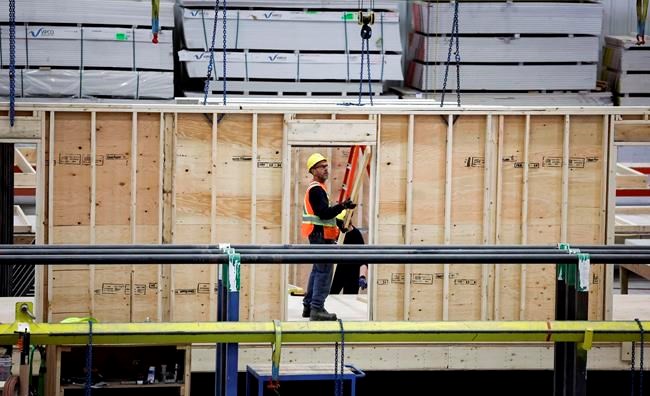TORONTO — Some advocates are praising Ottawa's move to lengthen the amortization period on insured mortgages for certain homebuyers, but say expanding the policy to all Canadians would help make home ownership more affordable.
Speaking in Toronto on Thursday, Finance Minister Chrystia Freeland announced the federal government will allow 30-year amortization periods on insured mortgages for first-time homebuyers purchasing newly built homes.
The change will take effect Aug. 1.
Under the current rules, if a down payment is less than 20 per cent of the home price, the longest allowable amortization — the length of time a homeowner has to repay their mortgage — is 25 years.
"Faced with a shortage of housing options and increasingly high rent and home prices, younger Canadians understandably feel like the deck is stacked against them," Freeland said in a news release.
"By extending amortization, monthly mortgage payments will be more affordable for young Canadians who want that first home of their own."
Mortgage Professionals Canada CEO Lauren van den Berg called it a "step in the right direction" and said extending the amortization period "will help level the playing field for first-time homebuyers."
"We know that this is going to allow greater opportunities for home ownership and will ultimately contribute to economic revival and economic recovery," she said in an interview.
"But more still needs to be done for all Canadians to have that dream of home ownership within sight."
Van den Berg said the government should expand the option to all Canadians purchasing a home, regardless of whether it is a new build or a pre-existing home.
"There are a lot of areas, particularly in the Greater Vancouver area and in the Greater Toronto Area, where you have no choice but to build up, so the possibility for new builds are not the same across the country."
Ratesdotca mortgage and real estate specialist Victor Tran also raised concerns about how effective the change would be based on the eligibility criteria.
“While it’s currently possible to get an insured mortgage with a new build, it’s rare," he said in a statement.
Tran also pointed out many properties in Vancouver and Toronto are priced at more than $1 million, which typically means buyers have to take uninsured mortgages.
But Canadian Home Builders' Association CEO Kevin Lee said the announcement would be a "game changer." The group has also been in favour of longer amortization periods, saying five more years would help with affordability and spur more construction.
“This measure will also go a long way to enable our sector to respond to the government's goal of getting 5.8 million new homes built over the next decade," he said in a statement.
"This measure is needed now to help turn the market around, and will be needed for many years to come if we are to work towards doubling housing starts."
He said the rental market should see some relief too, as the move could enable some Canadians to stop renting and become homeowners.
As part of the announcement, Freeland also said the government will raise the amount first-time homebuyers can withdraw from their RRSPs — to $60,000 from $35,000 — to buy a home. That will take effect April 16, the day the federal budget is set to be released.
The government said the change reflects the reality that the size of a down payment and the amount of time needed to save up for one are much larger than they used to be.
People who have made or will make withdrawals between Jan. 1, 2022, and Dec. 31, 2025, are also getting more time to begin repayment — up to five years in total rather than two.
Ottawa said those changes are meant to work in tandem with the First Home Savings Account, which it launched last year. The rules governing that program allow prospective homebuyers to start saving for up to 15 years once they open an account, with an annual $8,000 deposit cap and a lifetime contribution limit of $40,000.
Freeland said more than 750,000 Canadians have opened an FHSA to date. While the program came online April 1 of last year, most Canadian financial institutions only began offering the account as of last summer or fall.
Ottawa also announced changes to the Canadian Mortgage Charter that will include an expectation that financial institutions offer permanent amortization relief to protect existing homeowners who meet certain eligibility criteria.
That would allow eligible homeowners to reduce their monthly mortgage payment to a number they can afford for as long as needed.
This report by The Canadian Press was first published April 11, 2024.
Sammy Hudes, The Canadian Press




